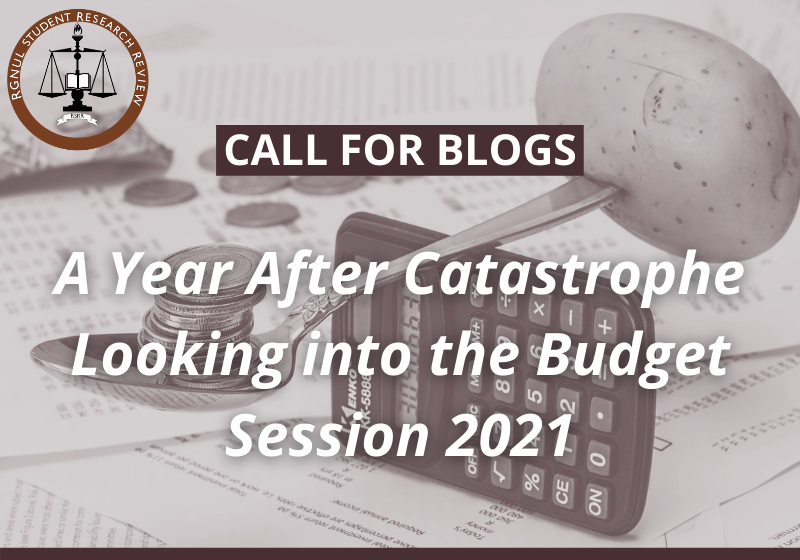Call for Blogs: A Year After Catastrophe: Looking into the Budget Session 2021 | RSRR [Submit by March 20]
RSRR Blog Series invites submissions on the theme “A Year After Catastrophe: Looking into the Budget Session, 2021” from students, academicians, lawyers, and other professionals from the legal fraternity. About Call for Blogs A year after the global ravage forced by the novel Coronavirus, world economies continue to find strategies to overcome financial as well as other ramifications… Read More »

RSRR Blog Series invites submissions on the theme “A Year After Catastrophe: Looking into the Budget Session, 2021” from students, academicians, lawyers, and other professionals from the legal fraternity.
About Call for Blogs
A year after the global ravage forced by the novel Coronavirus, world economies continue to find strategies to overcome financial as well as other ramifications brought by the virus. In this backdrop, the Indian Parliament has witnessed certain strong and promising measures introduced with the annual Budget. The onset of 2021 witnessed a 137% increase in the health budget, with the determination to fight the pandemic as an underlying driving force. Besides this, the ongoing Budget Session also witnessed the introduction of certain pertinent bills dealing with diverse areas of law, in the Parliament.
By the means of this Series, we intend to initiate a dialogue on these upcoming Bills amongst the potential stakeholders and the legal fraternity. The aim is to create a platform to bring about legal as well as policy analysis of these upcoming Bills (tabled/yet to be introduced or passed) in the context of the larger debate surrounding the modification of the Indian legal regime in 2021. The authors are encouraged to put forward the potential effects and constructive solutions for issues associated with the Bills.
About RGNUL Student Research Review
The RGNUL Student Research Review (RSRR) Journal is a bi-annual, student-run, blind peer-reviewed, flagship journal based at Rajiv Gandhi National University of Law, Punjab. It has been founded with the objective of facilitating arguments in black and white on contemporary and less explored issues through the themes chosen for the Journal as well as monthly blogs.
About RSSR Blogs
RSRR, in 2017, began with its Blog Series to provide a platform for critically analysing contemporary and unexplored legal issues. The RSRR Blog Series has been ranked among the top 35 Constitutional Law Blogs by Feedspot.
Deadline
The last date for submissions for this Series is 20th March 2021.
Bills of the Budget 2021
- The Finance Bill, 2021
- The Tribunals Reforms (Rationalisation and Conditions of Service) Bill, 2021
- The Arbitration and Conciliation (Amendment) Bill, 2021
- The DNA Technology (Use and Application) Regulation Bill, 2018
- The Maintenance and Welfare of Parents and Senior Citizens (Amendment) Bill, 2019
- The Competition (Amendment) Bill, 2021
- The Cryptocurrency and Regulation of Official Digital Currency Bill, 2021
- The Government of National Capital Territory of Delhi (Amendment) Bill, 2021
- The National Bank for Financing Infrastructure and Development (NaBFID) Bill, 2021
- The Prohibition of Employment as Manual Scavengers and their Rehabilitation (Amendment) Bill, 2021
The submissions are, however, not restricted to the aforementioned Bills, provided they fall within the ambit of the overarching theme of Bills in discussion in the Budget Session of 2021.
For more details on the sub-themes, refer to the Call for Blogs Available here.
Submission Guidelines
- All submissions must be in Garamond, font size 12, spacing 1.5.
- Referencing:
- Manuscripts must include hyperlinks for relevant legal sources and other information, including any laws, treaties or other legal texts which are mentioned.
- The Hyperlinks must only link to legal or reliable/respected news sources. The sources shall only be linked to primary sources. Hyper-linking to secondary sources may lead to re-corrections required from the authors.
- Relevant legal sources that cannot be accessed online may be cited as endnotes. The endnotes should be in Garamond, font size 10, single-spaced. A recognized, uniform style of citation is necessary for acceptance.
- Margins: Left 1 Inch, Right 1 Inch, Top 1 Inch, and Bottom 1 Inch.
- Word limit for each post is 1500-1800 words (exclusive of endnotes).
- Authors are required to provide an abstract of 100-150 words along with keywords that represent the essence of the submission. The abstract is to be submitted along with the article itself in the same document as the blog submission.
- The entries should be submitted only in .doc/.docx format.
- Entries that will be selected, after the review process, shall be published on the RSRR website.
- E-certificates will be awarded to the authors of each published blog.
- Co-authorship up to a maximum of 2 persons is permitted.
- The author(s) bear sole responsibility for the accuracy of facts, opinions or views stated in the submitted Manuscript.
- Plagiarism in any form is strictly prohibited.
- Copyright of all blog posts shall remain with RGNUL Student Research Review.
- All moral rights shall vest with the author(s).
- The manuscripts not abiding to the above guidelines are liable to be rejected.
Submission Procedure
All the submissions must be made through the Google Form. Any submission made via any other mode than the one suggested or even via mail shall not be considered.
Click here to Submit
Contact
In case of any query, authors can mail us at submissionsrslr@rgnul.ac.in.
RSRR website can be accessed here.
Reported by: RSRR Editorial Board

